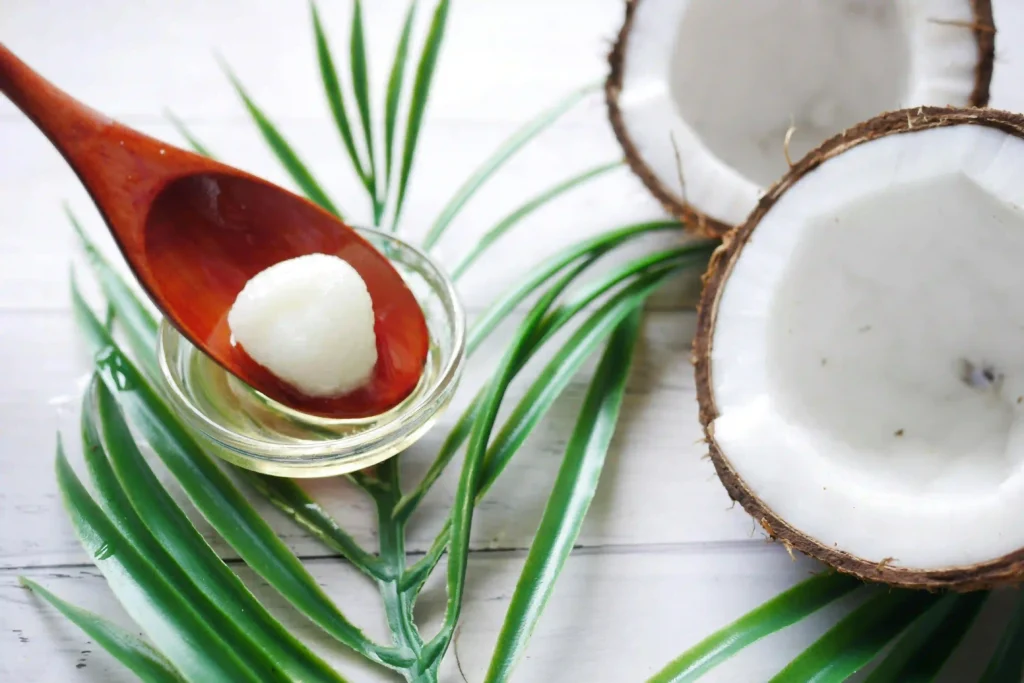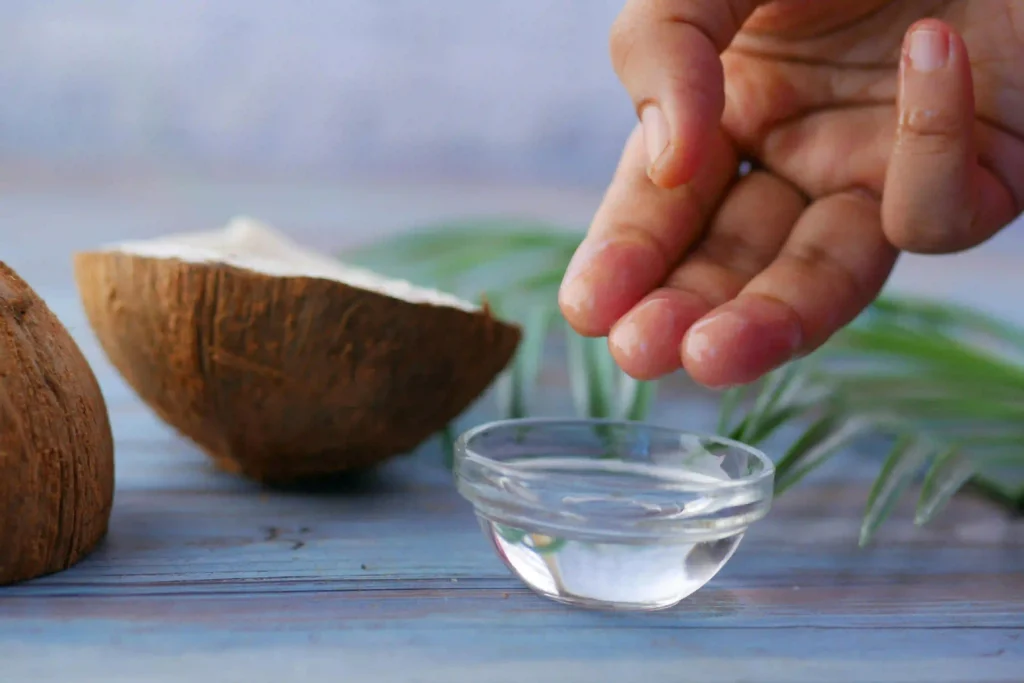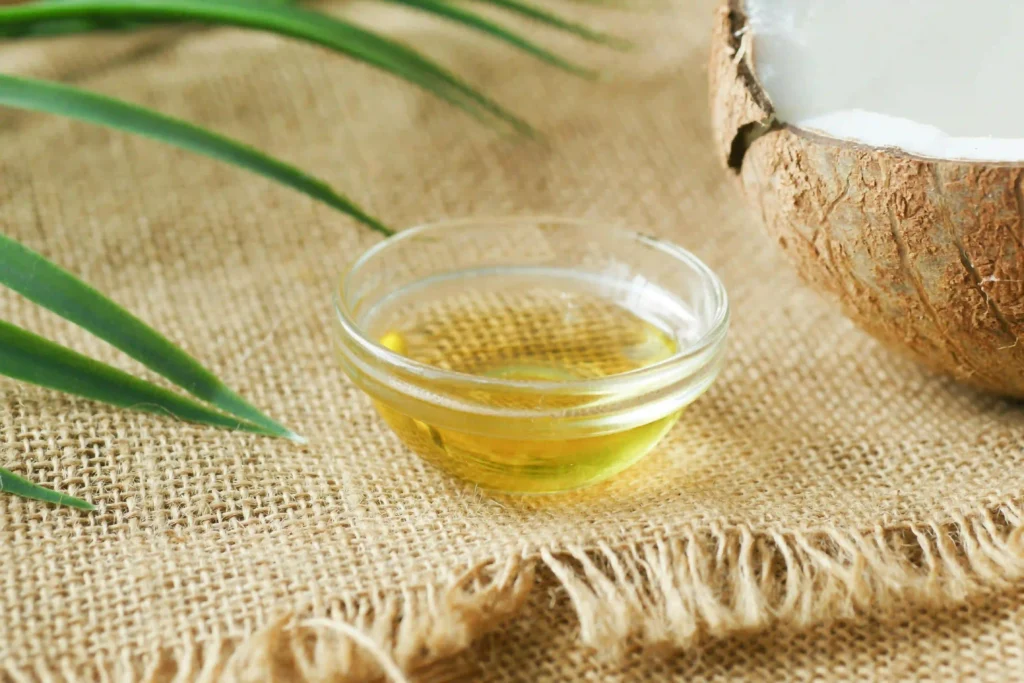Introduction: Understanding Coconut Oil as a Cooking Ingredient

People have started using coconut oil for cooking because of its special makeup together with health benefits along with adaptability for various uses. Coconut oil serves well during frying and baking and sautéing but people frequently question its usefulness as a healthy cooking ingredient. An analysis of coconut oil as a cooking ingredient requires examination of its features plus health benefits versus alternative cooking fats. You can also about Is Coconut Oil Suitable for Cooking.
Table of Contents
1. Types of Coconut Oil: Refined vs. Unrefined
There exist two main categories of coconut oil which include refined and unrefined (natural or virgin). Submission to refining processes cleans coconut oil while adding a neutral flavor and extended heat tolerance which lets the oil work at high temperatures. The processing methods for unrefined coconut oil minimize its treatment while keeping both coconut scent and valuable ingredients intact. Individuals who want an organic cooking oil and seek a gentle coconut taste in their meals should choose this product.
2. Smoke Point of Coconut Oil: Is It Safe for High-Heat Cooking?
Oil temperature stability toward heat depends heavily on its smoke point which determines when undesirable chemical breakdown occurs to create toxic compounds. The refined version of coconut oil allows heat up to 400°F (204°C) which enables frying and roasting. Cooking at medium temperatures with unrefined coconut oil is best since its smoke point reaches 350°F (177°C). The suitable oil selection depends on how you want to prepare your food.
3. Health Benefits of Cooking with Coconut Oil
Body cells can efficiently use MCTs from coconut oil because these substances enter through rapid absorption pathways. Medical experts confirm that the MCT components in coconut oil support both metabolic system function and neurological system function and digestive processes. Lauric acid contained within coconut oil produces its antimicrobial properties. You need to monitor your coconut oil consumption since high amounts of consumption can increase LDL cholesterol but controlled amounts provide health benefits.
4. Does Coconut Oil Affect the Flavor of Food?
The flavor effects of coconut oil can be identified through refined and unrefined processing methods. Unrefined coconut oil brings forth tropical elements such as coconut aroma and mild sweetness which enhances tropical cuisine and specific curries. Refined coconut oil displays no flavor which makes it work well for dishes where coconut taste should not dominate the final product.
5. Coconut Oil vs. Other Cooking Oils

Among all edible oils coconut oil stands out because its nutritional composition contains a large proportion of saturated fats as MCTs. The cholesterol debate exists regarding coconut oil but olive and avocado oils carry higher amounts of the heart-healthy unsaturated fats. Vegetable oils contain omega-3 fatty acids but coconut oil does not have similar fatty acid components. The benefits of using coconut oil in food preparation exist but people must combine its usage with other high-nutrient cooking oils for optimal results.
6. Best Cooking Methods for Using Coconut Oil
People use coconut oil to prepare their food using different types of cooking methods. Users can apply it successfully during baking and sautéing and roasting as well as replace butter when preparing vegan dishes. The solidifying characteristic of coconut oil allows its use in spread and dressing production. When deep-frying it is more suitable to use avocado or peanut oil because their higher smoke point allows better results.
7. Is Coconut Oil Suitable for Frying?
The refined form of coconut oil reaches sufficient temperatures to make it suitable for frying purposes. The solid form of coconut oil enables it to work appropriately for frying vegetables and meats and cooking eggs. Deep-frying requires an oil substitute other than olive oil since it is too costly along with a limited lifespan that makes canola or sunflower oil more suitable alternatives. The use of coconut oil for frying requires controlled temperatures because cooking at high heat levels leads to burning.
8. Using Coconut Oil in Baking: Pros and Cons
Coconut oil functions as a butter substitute in baked goods because it offers mild coconut notes with enhanced wetness yet requires melting before use. The substance functions optimally in all types of cakes as well as cookies and muffins and serves excellently as a dairy-free or vegan recipe substitute. The solid form of coconut oil at room temperature might need melting prior to mixing applications. Health benefits from coconut oil include beneficial fats but its saturated fat level causes potential worries about consumption. The correct approach is to limit usage to recipes specifically designed for its nutty flavor profile.
9. Coconut Oil for Sautéing and Stir-Frying
When heated at moderate temperatures coconut oil serves as an excellent choice for sautéing along with stir-frying. The slight coconut fragrance of this oil suits vegetables, meats along with tofu resulting in perfect pairings for Asian and tropical cuisine. The use of unrefined coconut oil allows meals to gain additional flavors yet refined oil does not introduce any taste changes. Coconut oil has faster burning characteristics than avocado or peanut oil thus it is most ideally suited for quick cooking at medium heat levels.
10. Can Coconut Oil Replace Butter in Cooking?
The properties of coconut oil function excellently as a butter substitute in various dishes including those meant for individuals following either a vegan diet or those living with lactose intolerance. The substance functions effectively for baking preparations and frying methods and as a spread on toast. Coconut oil does not duplicate the characteristic creamy texture together with slight saltiness which characterizes butter. Due to its higher content of saturated fat you need to limit your consumption of coconut oil. To preserve the integrity of culinary recipes follow a 1:1 ratio because coconut flavor adds better impact than dominance when used in certain dishes.
11. Coconut Oil and Heart Health: What Research Says
The research about coconut oil’s impact on cardiac wellness produces conflicting results. Fats in coconut oil contain MCTs that are beneficial to health but the high saturated fat content elevates LDL (bad) cholesterol in the bloodstream. The evidence suggests heart health remains unaffected by moderate coconut oil intake yet professionals suggest cooking with unsaturated fats such as olive or flaxseed oil above using coconut oil alone for primary cooking needs.
12. Does Coconut Oil Help with Weight Management?

Coconut oil gets recognized as potential weight-management support because of its MCTs that generate quick energy metabolism. Academic research implies that consuming MCTs leads to heightened metabolism and boosts fullness sensations thus supporting weight reduction goals. Taking more than moderate amounts of coconut oil results in weight gain because it contains many calories. When using coconut oil for health benefits it should be eaten in controlled amounts with proper exercise and balanced meals.
13. Potential Downsides of Cooking with Coconut Oil
Most of coconut oil’s advantages exist alongside some disadvantages. Merging too many saturated fats from coconut oil will potentially elevate LDL cholesterol levels in the body. Raw coconut oil delivers a potent taste which could negatively impact certain food dishes. The price of using coconut oil for cooking may exceed the cost of alternative edible oils in the market. People with cholesterol problems can use coconut oil sparingly yet they need to combine this with dietary foods containing beneficial unsaturated fats to support heart health.
14. How to Store Coconut Oil for Maximum Freshness
Keep coconut oil in a cool dry environment which should also be shielded from solar rays. On its own it becomes solid when the temperature reaches below 76°F (24°C) yet it stays edible after melting above this point. The shelf durability of this product can be increased by using an airtight packaging method. The storage cold temperature is not required for coconut oil but it helps minimize its exposure to air that causes deterioration. You should always use a clean spoon when accessing coconut oil to maintain its purity. Storing coconut oil correctly maintains its freshness potential alongside preserving all of its nutritional content.
Conclusion: Should You Use Coconut Oil in Your Kitchen?
The oil from coconuts serves as a multipurpose culinary item which includes advantageous aspects and negative elements. The distinct flavor of coconut oil combined with its cooking stability makes it valuable for cooking but people should limit their consumption because of its saturated fat content. The cooking range of coconut oil includes sautéing and baking along with medium-heat frying although deep-frying might not be its optimal use. The consumption of coconut oil in small amounts together with other nutritious oils enables a well-balanced nutrition plan that features both benefits and distinctive qualities.